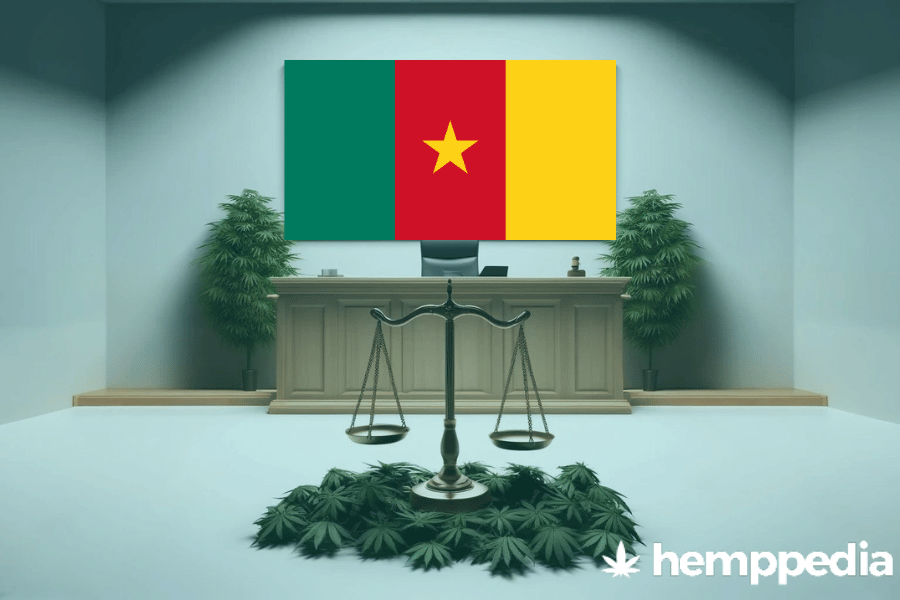TL;DR
The legal situation regarding cannabis in Cameroon is quite clear: both THC and CBD are considered illegal, regardless of whether they are used for recreational or medical purposes. The table below gives a summary of the legal situation:
| Recreational Use | Medical Use | |
|---|---|---|
| THC | Illegal | Illegal |
| CBD | Illegal | Illegal |
Introduction
Understanding the legal situation of cannabis in various areas of the world, such as Cameroon, has a notable significance due to the global trend towards either the legalization, decriminalization, or stricter controls of the substance. It’s important to understand the key terms associated with cannabis laws, such as legalization, decriminalization, medical use, and recreational use, and explore the diversity of these laws worldwide.
Overview of Cannabis Legislation
- Legalization: The process of making cannabis lawful. Legal status can vary widely from country to country, ranging from a fully regulated market to a “hands-off” approach with few rules.
- Decriminalization: The act of removing criminal sanctions against cannabis use, though it remains illegal. Decriminalization usually involves penalties or restrictions.
- Medical use: Legal use of cannabis for medicinal purposes. This can refer to any part of the cannabis plant, used to relieve symptoms of an illness or medical condition.
- Recreational use: Legal use of cannabis for enjoyment, typically involving psychoactive effects.
Cameroon-Specific Legal Details
Legal Status
Both THC and CBD are considered illegal, regardless of whether they are used for recreational or medical purposes. Despite this, cannabis is widely used and largely tolerated in some parts of the country.
Historical Context
Cannabis has a long history in Cameroon, with its use embedded in many traditional practices and cultures. However, Cameroon’s Drug Law 97/019 of 1997 makes no distinction between soft and hard drugs, making even small amounts of cannabis subject to penalties, including imprisonment and fines.
Possession and Use
Possession of any amount of cannabis in Cameroon is considered illegal. Any consumption, whether in private residences or public spaces, is also illegal.
Cultivation and Distribution
The cultivation and distribution of cannabis is also illegal. Despite this, it is still one of the top cannabis-producing countries in Africa – a situation that could be attributed to the combination of conducive climate, weak law enforcement, and systemic corruption.
Enforcement and Penalties
Anyone found in possession of, distributing, or cultivating cannabis can face up to 20 years in prison or a hefty fine, under Cameroon’s penal code.
Medical Cannabis
There are currently no laws or regulations that allow for the medicinal use or research of cannabis in Cameroon.
Social and Economic Impact
While empirical data on the social and economic impacts of the illegal status of cannabis in Cameroon is scarce, anecdotal evidence suggests that the strict penalties associated with cannabis use and trade may contribute to overcrowding in prisons and perpetuate systemic corruption within law enforcement and judicial sectors.
Comparative Analysis
Compared to other African nations, Cameroon’s cannabis laws are relatively strict. However, despite stiff penalties, the enforcement of these laws is inconsistent and marked by systemic corruption. This situation parallels the general trend in many parts of Africa.
Future Outlook and Ongoing Debates
There are currently no plans to change the legislation regarding cannabis in Cameroon. However, considering global trends towards decriminalization and legalization, it is possible that policy changes could occur in the future.
Conclusion
While Cameroon has strict laws regarding cannabis, the enforcement of these laws is inconsistent. Despite no immediate plans to change the legislation, future policy changes cannot be completely ruled out. Globally, we’re seeing a growing dialogue about cannabis legalization, reflecting changing attitudes towards the drug.





